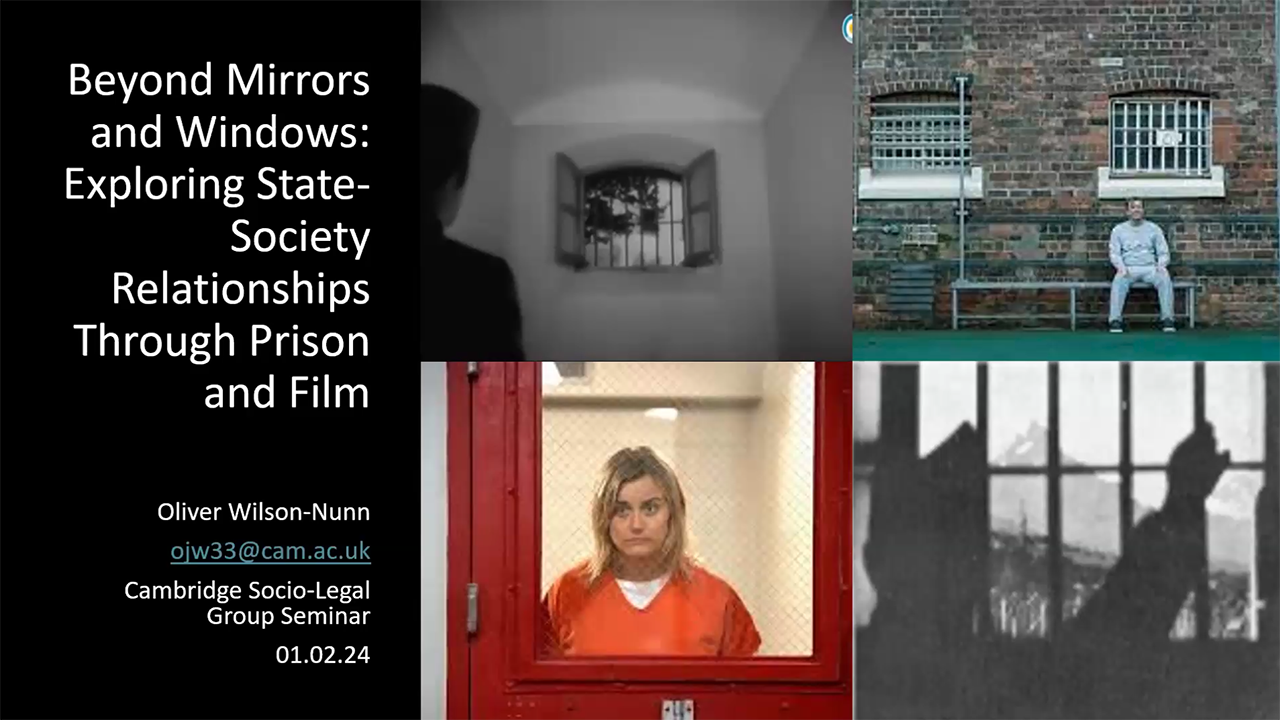'Beyond Mirrors and Windows: Exploring State-Society Relationships Through Prison and Film': CSLG seminar
Duration: 29 mins 32 secs
Share this media item:
Embed this media item:
Embed this media item:
About this item

| Description: |
Speaker: Oliver Wilson-Nunn
Bio: Oliver Wilson-Nunn is an Isaac Newton Research Fellow at Robinson College, University of Cambridge. He recently completed his PhD on prison and film in Argentina at the Centre of Latin American Studies, University of Cambridge. He has published on prison education in contemporary documentary film and on prison writing from Cuba. He is broadly interested in the relationship between law, criminal justice, and culture in Latin America, with his new project focussing on the relationship between contemporary documentary cinema and the processes of judicialisation and juridification. Prison, the cliché goes, serves as a mirror of society. Films about prison, according to a similarly clichéd logic, serve as a window onto that mirror of society. In this presentation, I move beyond this focus on reflection and refraction to propose a more materially sensitive approach to what prison-based films can tell us about state and society. I reflect on the institutional relationships between the film industry and prisons to show how the very production and exhibition of film—not just the symbolic force of the image itself—reconfigure the relationships between imprisoned people, non-imprisoned people, and the state. Focussing on Argentina, I consider examples of location shooting inside operational prisons, the use of imprisoned people as actors, and the exhibition of film inside prison from the 1930s through to the present day to trouble a tendency among academic lawyers, criminologists, and film scholars to evaluate prison films in terms of their ‘accurate’ or ‘inaccurate’ representation of real-life prisons. By shifting our focus from the truth value of the strictly defined ‘prison film’ towards the broader social relationships produced at the institutional interstice of prison and film, we can better understand prison, following Ruth Wilson Gilmore, not as a ‘building “over there” but a set of relationships that undermine rather than stabilize everyday lives everywhere’ (2007, 242). The Cambridge Socio-Legal Group organises and supports events and publications relating to socio-legal research, drawing participants from within the University of Cambridge and around the world. For more about the CSLG, see: https://www.law.cam.ac.uk/researchfaculty-centres-networks-and-groups/cambridge-socio-legal-group The CSLG organises and supports events and publications relating to socio-legal research, drawing participants from within the University of Cambridge and around the world. A donation would be instrumental in allowing the Cambridge Socio-Legal Group to continue its cross-disciplinary work: https://www.philanthropy.cam.ac.uk/give-to-cambridge/the-cambridge-socio-legal-group |
|---|
| Created: | 2024-02-01 15:21 |
|---|---|
| Collection: | Cambridge Law: Public Lectures from the Faculty of Law MOVED |
| Publisher: | University of Cambridge |
| Copyright: | Daniel Bates |
| Language: | eng (English) |
Available Formats
| Format | Quality | Bitrate | Size | |||
|---|---|---|---|---|---|---|
| MPEG-4 Video | 1280x720 | 2.92 Mbits/sec | 647.50 MB | View | Download | |
| MPEG-4 Video | 640x360 | 1.33 Mbits/sec | 295.09 MB | View | Download | |
| WebM | 1280x720 | 1.79 Mbits/sec | 397.81 MB | View | Download | |
| WebM | 640x360 | 433.1 kbits/sec | 93.74 MB | View | Download | |
| iPod Video | 480x270 | 483.51 kbits/sec | 104.59 MB | View | Download | |
| MP3 | 44100 Hz | 249.76 kbits/sec | 54.09 MB | Listen | Download | |
| MP3 | 44100 Hz | 62.23 kbits/sec | 13.52 MB | Listen | Download | |
| Auto * | (Allows browser to choose a format it supports) | |||||

